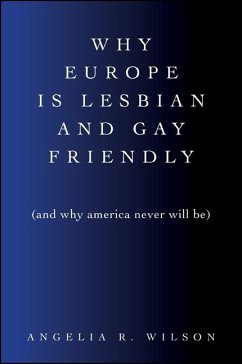Offers an analysis of the political economy of care in order to explain how lesbian and gay citizens in Europe benefit from equality more than those in the United States.
Why Europe Is Lesbian and Gay Friendly (and Why America Never Will Be) examines the differences in politics, policy, and culture in leading Western democracies and offers an explanation as to why lesbian and gay citizens in Europe reap more benefits of equality. This analysis of the political economy of care calls attention to the ways in which care is negotiated by various investors (the state, families, individuals, and the faith-based voluntary sector) and the power dynamics of this negotiation.
Historically, Christian churches have been leading primary investors in care, providing a direct safety net for children and the elderly. Despite European secularization, the involvement of the Christian church elites in both the provision of service and the setting of the values frame for welfare cannot be underestimated. The historical involvement of Christian churches is unique in each country, but one common factor is the normative interpretation of "the family." The role of Christian values-from left-leaning social justice, Reformed Protestant individualism, or social conservatism-in relation to the political economy of care gives a distinctive flavor to questions about under what circumstances policymakers are compelled, or not, to expand policies to include lesbian and gay citizens.
Why Europe Is Lesbian and Gay Friendly (and Why America Never Will Be) examines the differences in politics, policy, and culture in leading Western democracies and offers an explanation as to why lesbian and gay citizens in Europe reap more benefits of equality. This analysis of the political economy of care calls attention to the ways in which care is negotiated by various investors (the state, families, individuals, and the faith-based voluntary sector) and the power dynamics of this negotiation.
Historically, Christian churches have been leading primary investors in care, providing a direct safety net for children and the elderly. Despite European secularization, the involvement of the Christian church elites in both the provision of service and the setting of the values frame for welfare cannot be underestimated. The historical involvement of Christian churches is unique in each country, but one common factor is the normative interpretation of "the family." The role of Christian values-from left-leaning social justice, Reformed Protestant individualism, or social conservatism-in relation to the political economy of care gives a distinctive flavor to questions about under what circumstances policymakers are compelled, or not, to expand policies to include lesbian and gay citizens.
Dieser Download kann aus rechtlichen Gründen nur mit Rechnungsadresse in A, D ausgeliefert werden.









